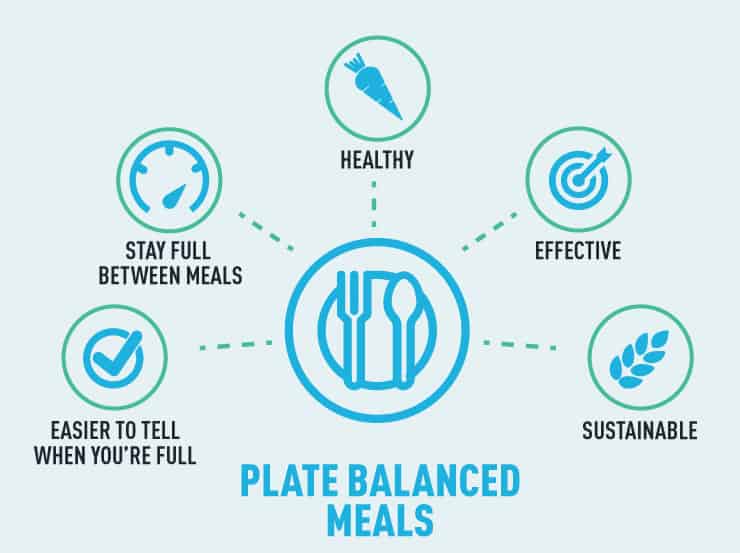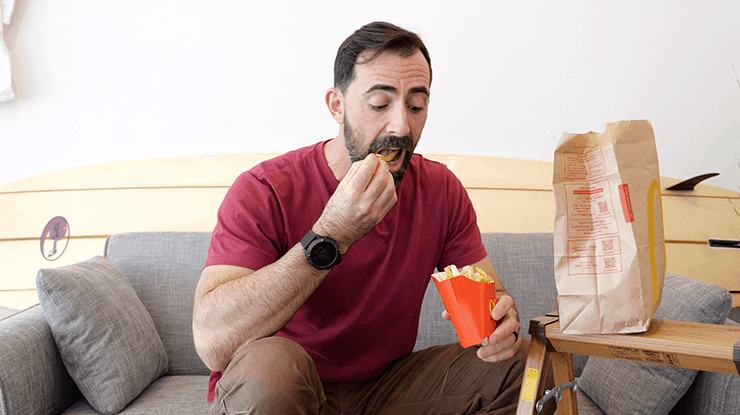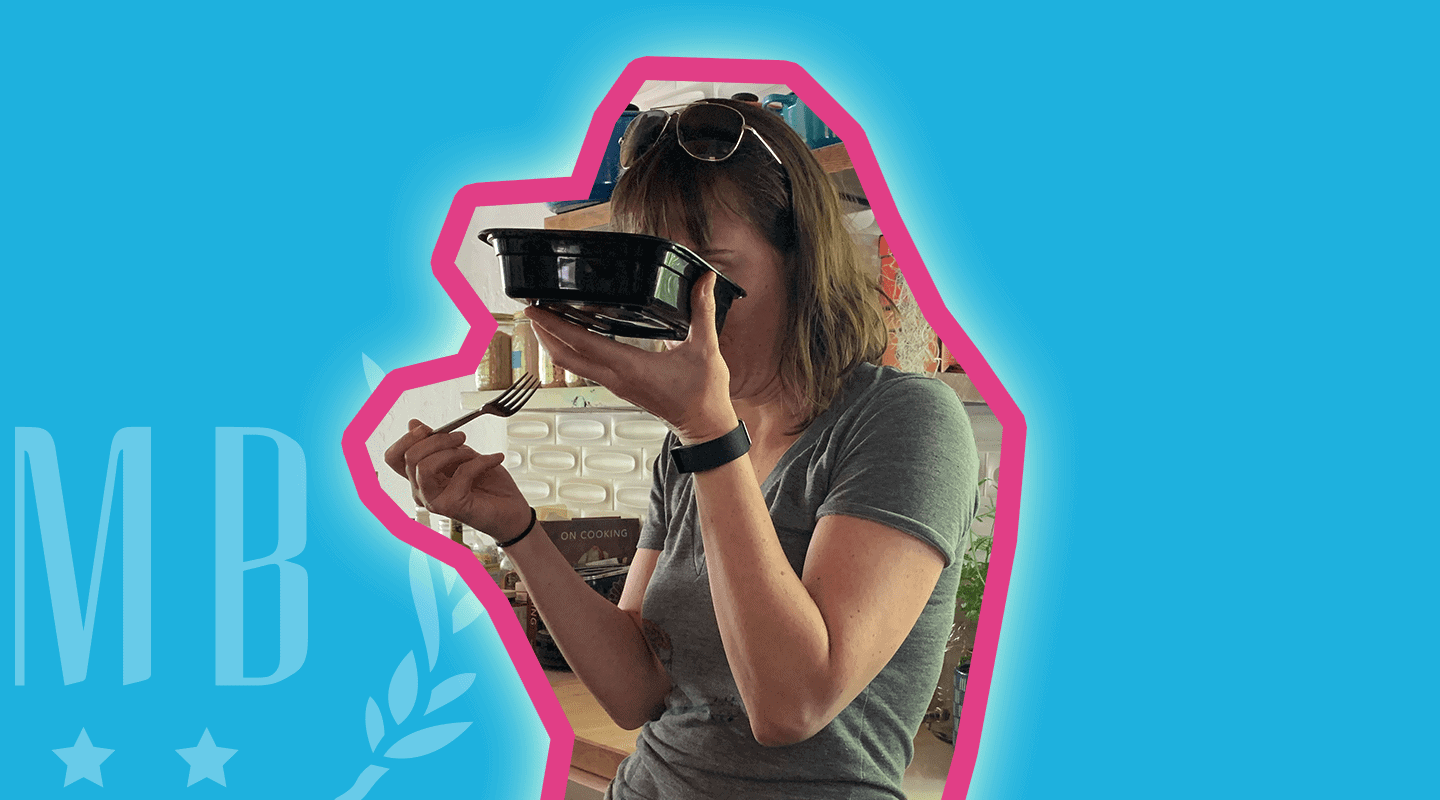You have goals.
Making changes to how we eat is tough under the best of conditions. It’s even harder when life gets stressful.
World-wide, 42% of adults attempted to lose weight last year. Where I live, in the United States, it’s even higher at 49%.
That’s a lot of people attempting to lose weight every year, who are mostly not succeeding.
Many people have tried the Ketogenic Diet, Paleo, the Whole 30, Intermittent Fasting, The Zone, Eating Clean, or Weight Watchers. Whatever they’ve tried, they did well for a while, and then at some point it all came apart. This is what we call a diet trap.

And at the point it all comes apart is the week your life gets more stressful. Unfortunately, we’re often told that it was a failure of willpower on our part, and not the diet we were given.
Because we can’t outright avoid stress, we need a system to consistently eat healthy foods, despite inevitable stress.
What we need are eating skills, not a bunch of hard-to-follow diets.
In this post, we’re going to look at five ideas:
- Two simple guidelines
- Two eating skills
- One tool for overcoming obstacles
Those five ideas are going to give you a system to keep you in the driver’s seat with your nutrition, even when schedules are packed, difficult things are happening, and life gets messy. Like they did for Gracelyn:

Ready to get into it? First let’s look at why the usual diet approaches are essentially powerless against stress.
When all of our commitments collide, it’s stressful

Most of us deal with a ton of stress each day.
It could be a big project at work, kids dealing with school during a pandemic, figuring out how to hang with friends while physically distanced, and even trying figure out how to fit a fitness program into our routine. All of these things are important parts of our lives, but they can stack up in ways that are stressful, oftentimes overwhelming.
It’s cool to have lots of people and things that are important to us. But, sometimes they all need us at the same time, which can feel like too much.
The pandemic is adding another layer of stress on top of everything else, which is unlike anything we’ve ever had to deal with before.
And when we’re under this stress, we usually default to food that’s fast, easy, and low quality. For many, it’s easy to snack on crap food between meals. Stress eating works well for numbing out stress in the short term, but it can get in the way of our fitness goals in the long term.
Diets are the Problem, Not the Solution
In the fitness world, the typical go-to ‘fix’ for all things nutrition is finding a diet. We’re told that if we can find the magic set of diet rules, all of our dreams will come true.
Unfortunately, diet rules are rigid. We’re told we have to be perfect with our diet, or we’re better off starting again next week. It’s a kind of perfection required with diets that make them a recipe for disaster when life get stressful.
And when life gets stressful, perfection is impossible.

For most of us to make a rigid diet work, we need a completely stress-free life. In case it’s not crystal clear at this point… most diets are doomed from the start.
If you have a full life with lots of commitments that matter to you, we suggest you avoid diet rules like the plague.
Two Eating Skills
Alright, let’s dive right in to two useful eating skills:
- Differentiating hunger from stress cravings
- Normalizing stress and getting unhooked
Differentiating hunger from stress cravings is super important. But to do this, you must be able to figure out when you’re hungry, and when you’re stressed out.
Here’s how by asking yourself three questions:
- Do I feel a hollow feeling in my stomach?
- Am I hungry for a balanced meal?
- If I pause for 10-20 minutes, am I still hungry?


- If you answer “yes” to a couple of those questions, you’re totally hungry! Go eat a meal!
- If you answer “no” to those questions, it’s probably just stress.
If it’s stress and not hunger, you will have to accept how normal it is to be stressed in our modern world. We treat stress like it’s always something that needs to be fixed, like it’s something that we shouldn’t feel.
But often, if we take a step back and get real about how much work we have on our plate, it’s clear that any normal human would feel stressed out.
If we note that we have a normal amount of stress given the situation that we’re in, then we can also recognize that it isn’t something we need to fix with food. If hunger isn’t the problem, then food isn’t the solution.
Getting unhooked is the combination of all of this: Distinguish that it’s stress, not hunger. Note that it’s okay to feel stressed out in the situation you’re in. And then notice that you don’t have to fix it.
If we can label it as stress (instead of hunger), we unhook ourselves. The stress is still there, but we don’t have to take the action of eating.
You might take a walk, you might do some deep breathing, or you might watch a silly cat video on YouTube. Sometimes, though, you don’t even have time for that. All we can do is unhook from the idea of feeding our stress, and let ourselves be human. We unhook and go back to work.
The process of unhooking is a combination of skills over weekly lessons in the our Eating Skills program. So, if it isn’t entirely clear how to do it right now, that’s okay.
If you can just begin to practice noticing if it’s hunger or stress, and labelling what you’re feeling (as stress or hunger), you’ll be granted a fair amount of unhooking power to not eat your feelings.
Two Eating Guidelines
These are going to almost seem silly with how simple these are, but that’s why they’re so effective:
- Plate balanced meals
- Fast 4-6 hours between meals
Plating balanced meals sounds obvious, but if you aren’t familiar with this practice, you’re going to be extra hungry between meals. You need to eat a good balance of nutrients, and enough food, to keep yourself satisfied.
Avoiding stress eating is hard enough anyway. If you add hunger on top of stress, it becomes much harder. So, make sure to get some vegetables, protein, carbohydrates, and fat with every meal. This way, you increase your chances of taking hunger off of the table.

Fasting 4-6 hours between meals is simply a guideline for learning the skills above, distinguishing hunger from stress, and accepting and unhooking from stress cravings. It’s a guideline that reminds you to check in with those skills.
For example, if you had lunch two hours ago, and all of a sudden you want a muffin in the break room at work, that’s a red flag. If it’s been less than 4 hours, you really want to check in with those three questions. It’s unlikely that you feel a hollow feeling in your stomach, or that you’re hungry for a balanced meal, so it’s probably stress.
Again, if you are hungry, go eat a meal. But then that lets you know that your previous meal was either too small or it wasn’t balanced.
So, 4-6 hours between meals is a guideline (not a rule) that works like training wheels for learning the skills of checking in with yourself about hunger vs. stress cravings.

Obstacle Planning is the Way

You’re going to have obstacles. You’re going to have stress. But most people, even with the best intentions of how they want to eat, end up getting surprised and knocked off course by the same obstacles over and over again.
You need to spend some time at the beginning of every week thinking through the obstacles that you’re going to have.
You can start to think through and create plans for the normal obstacles that you’re going to encounter.
Here are some examples:
Obstacle: You have a big project due this week, you know you’re going to feel stressed out.
- Step 1 – Accept and get unhooked: Recognize that the stress you are feeling is normal, given the deadline you have. It’s okay and doesn’t need to be fixed. You learn to be with it in-the-moment, using the “Let the Monsters Ride the Bus” metaphor.
- Step 2 – Add in self-care: You can put in some kind of self-care, like doing some meditation after work.
Obstacle: You have a big argument with your spouse.
- Step 1 – Accept and get unhooked: Recognize that the stress you are feeling is normal, given the argument you just had. It’s okay and doesn’t need to be fixed. You want to get some perspective on it, and you get that by journaling your feelings for five minutes.
- Step 2 – Add in self-care: You can put in some kind of self-care right now, like going for a walk.
Obstacle: Your kids are bouncing off of the walls because they don’t like doing school on zoom.
- Step 1 – Accept and get unhooked: Recognize that the stress you are feeling is normal. Then recognize that that the stress you are feeling is normal, because you care about them. The stress is okay and doesn’t need to be fixed. You take note of the thoughts and feelings you are having, and that you’re willing to feel that stress, because you care about your family.
- Step 2 – Add in self-care: You put in some kind of self-care, maybe some extra exercise (for you and for them), or coloring books (for you and for them), or family games. This will probably come at a later time.
It’s important to note that, in all of those examples, you recognize that the stress isn’t going to get fixed. You’re willing to be okay with that fact and sit with it. You’re planning and preparing to feel the stress that you know you are going to have. It isn’t about making stress go away, because eliminating it won’t always be possible.
You feel stress because you care about those things, and you’re going to continue to care.
The self-care, then, isn’t about fixing stress or making it go away. The self-care portion is there because you are under stress, and you need to take care of yourself. It’s cool to take part in things like walking, meditating, breathing, doing a coloring book, listening to music, sitting in your backyard, whatever.
This is basic human maintenance for a stressful life.
The basic level of planning is to expect to feel the stress that you are going to feel next week. If you expect it, you can plan your eating skills practice accordingly.
Most people get caught flat-footed when obstacles and stress show up. A few minutes each week of planning your week, thinking through your obstacles, and then expecting to have obstacles, will make all the difference.
5 Ways To Deal With Stress Eating

Now you have a solid roadmap to how to manage stress eating:
- Differentiating hunger from stress cravings
- Acceptance and getting unhooked
- Plate balanced meals
- Fast 4-6 hours between meals
- Planning for stressful obstacles to show up
Do your planning at the beginning of the week, and then practice the skills and guidelines the rest of the week.
Eating skills are like movement skills. They get better with practice and they’re progressive.
If you’re practicing movement skills, you’ll get stronger, develop more motor control, and more mobility. Similarly, if you’re practicing eating skills, you’ll develop the ability to distinguish stress and to not have it drive your eating.
It takes time, but it’s worth it.
Developing eating skills puts you in the driver’s seat with your eating.
Take the Stress Out of Hitting Your Nutrition Goals
The coaches and community in Eating Skills help you master the skills not just for beating stress eating, but to finally feel totally in control of your nutrition results.


